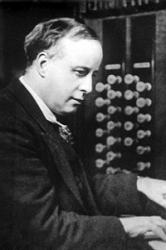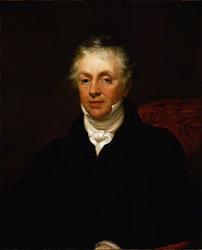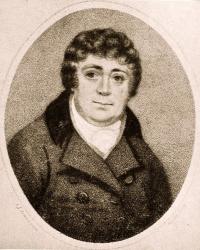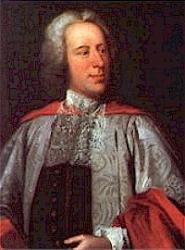Planning worship?
Check out our sister site, ZeteoSearch.org,
for 20+ additional resources related to your search.
- |
User Links
Person Results
Robert Cooke
1768 - 1814 Composer of "[Blessed be the Lord God of Israel]" in The Hymnal, Revised and Enlarged, as adopted by the General Convention of the Protestant Episcopal Church in the United States of America in the year of our Lord 1892
Robert Cooke
Henry G. Ley

1887 - 1962 Person Name: Dr. Henry G. Ley, 1887- Composer of "[Blessed be the Lord God of Israel]" in The Book of Common Praise Born: December 30, 1887, Chagford, Devonshire, England.
Died: August 24, 1962, near Ottery, Devonshire, England.
Ley trained as a chorister at St. George’s Chapel, Windsor, as a music scholar at Uppingham, the Royal College of Music, and as an organ scholar at Keble College, Oxford. He was Precentor of Radley College; organist at Christ Church Cathedral, Oxford (1909-26); Choragus of the University, Oxford; professor of the organ at the Royal College of Music (1919); and organist at Eton College.
Sources:
Frost, p. 680
West, p. 87
http://www.hymntime.com/tch/bio/l/e/y/ley_hg.htm
Henry G. Ley
Thomas Attwood

1765 - 1838 Person Name: Thomas Attwood, 1765?-1838 Composer of "[Blessed be the Lord God of Israel] " in The Hymnal 1982 Thomas Attwood, born 1767; organist and composer; wrote many operas and other works; died March 24, 1838.
A Dictionary of Musical Information by John W. Moore, Boston: Oliver, Ditson & Company, 1876
Thomas Attwood
John Fenstermaker
b. 1942 Person Name: John Fenstermaker, Jr., b. 1942 Composer of "[Blessed be the Lord, the God of Israel]" in The Hymnal 1982 John Fenstermaker is an organist who has played the greatest organs ever. Born In Indianapolis In., he became a concert organist. A few of the organs he has played include Grace Cathedral and National Cathedral. He lives in Naples FL.
email to Hymanry
John Fenstermaker
Samuel Arnold

1740 - 1802 Person Name: S. Arnold Composer of "[Blessed be the Lord God of Israel] (Arnold)" in The Church Hymnal Dr. Samuel Arnold, an English musician and composer; born in London, Aug. 10, 1739; composed for the theatre, the church, and also oratorio music; succeeded Dr. Nares as organist; died at Westminster, Oct. 22, 1802.
A Dictionary of Musical Information by John W. Moore, Boston: Oliver, Ditson & Company, 1876
Samuel Arnold
George M. Garrett

1834 - 1897 Person Name: George M. Garrett (1834-1897) Composer of "[Blessed be the Lord God of Israel]" in The University Hymn Book Born: June 8, 1834, Winchester, Hampshire, England.
Died: April 9, 1897, Cambridge, England.
Buried: Cambridge Mill Road Cemetery, Cambridge, England
George M. Garrett
Herbert Stanley Oakeley
1830 - 1903 Person Name: H. S. Oakeley, 1830 - 1903 Composer of "[Blessed be the Lord God of Israel] (Oakeley)" in The Hymnary for use in Baptist churches
Herbert Stanley Oakeley
Garret Colley Wellesley, Earl of Mornington
1735 - 1781 Person Name: The Earl of Mornington Composer of "BENEDICTUS" in Hymns of the Kingdom of God Garret Colley Wellesley, Earl of Mornington, father of the Duke of Wellington; b. Dongan, Ireland, 1735; d. there, 1781
Evangelical Lutheran Hymnal, 1908
Garret Colley Wellesley, Earl of Mornington
Maurice Greene

1696 - 1755 Person Name: M. Greene Composer of "[Blessed be the Lord God of Israel] (Greene)" in The Church Hymnal Born: August 12, 1696, London, England.
Died: December 1, 1755, England.
Buried: Originally at St. Olave’s, Old Jewry. On the demolition of St. Olave’s, his remains were moved to St. Paul’s and placed in Boyce’s grave, May 18, 1888.
Maurice Greene (12 August 1696 – 1 December 1755) was an English composer and organist.
Born in London, the son of a clergyman, Greene became a choirboy at St Paul's Cathedral under Jeremiah Clarke and Charles King. He studied the organ under Richard Brind, and after Brind died, Greene became organist at St Paul's.
With the death of William Croft in 1727, Greene became organist at the Chapel Royal, and in 1730 he became Professor of Music at Cambridge University. In 1735 he was appointed Master of the King's Musick. At his death, Greene was working on the compilation Cathedral Music, which his student and successor as Master of the King's Musick, William Boyce, was to complete. Many items from that collection are still used in Anglican services today.
He wrote very competent music in the Georgian style, particularly long Verse Anthems. His acknowledged masterpiece, Lord, let me know mine end, is a representative example. Greene sets a text full of pathos using a polyphonic texture over a continuous instrumental walking bass, with a particularly effective treble duet in the middle of the work. Both this section and the end of the anthem contain superb examples of the Neapolitan sixth chord.
--en.wikipedia.org/wiki/
Maurice Greene


 My Starred Hymns
My Starred Hymns


